一般将来时的构成
一般将来时语法知识点
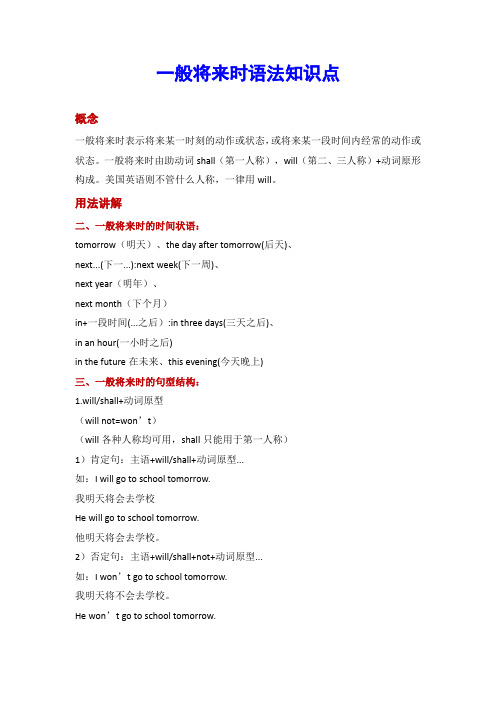
一般将来时语法知识点概念一般将来时表示将来某一时刻的动作或状态,或将来某一段时间内经常的动作或状态。
一般将来时由助动词shall(第一人称),will(第二、三人称)+动词原形构成。
美国英语则不管什么人称,一律用will。
用法讲解二、一般将来时的时间状语:tomorrow(明天)、the day after tomorrow(后天)、next...(下一...):next week(下一周)、next year(明年)、next month(下个月)in+一段时间(...之后):in three days(三天之后)、in an hour(一小时之后)in the future在未来、this evening(今天晚上)三、一般将来时的句型结构:1.will/shall+动词原型(will not=won’t)(will各种人称均可用,shall只能用于第一人称)1)肯定句:主语+will/shall+动词原型...如:I will go to school tomorrow.我明天将会去学校He will go to school tomorrow.他明天将会去学校。
2)否定句:主语+will/shall+not+动词原型...如:I won’t go to school tomorrow.我明天将不会去学校。
He won’t go to school tomorrow.他明天将不会去学校。
3)一般疑问句:Will/Shall+主语+动词原型...如:Will you go to school tomorrow?你明天要去学校吗?Will he go to school tomorrow?他明天要去学校吗?肯定回答:Yes,主语+will.如:Yes,I will.Yes,he will.否定回答:No,主语+will+not.如:No,I won’t.No,he won’t.4)特殊疑问句:特殊疑问词+will/shall+主语+动词原型... 如:What will you do tomorrow?你明天将会做什么?What will he do tomorrow?他明天将会做什么?2.be going to+动词原型1)肯定句:主语+be going to+动词原型...如:I am going to buy some books tomorrow.我明天打算去买一些书。
一般将来时

由于will后接动词原形, 因此在 “there be”句型一般将来时的句中 will之后用be动词的原形, 即“be”一词, 无论后面是单、复数或不可数名 词(短语)。 e.g. There won’t be any paper money.
There will only be one country.
( ) 14. If it ________ tomorrow, we’ll go rollerskating.真实条件句用于陈述语气,表示存在的情况可能发生。其 中t if 是如果的意思。 A. isn’ rain B. won’t rain 在 if引导的是条件从句,用一般现在时, 主句用将来时。 C. doesn ’t rain D. doesn’t fine 主句中一般用shall/will 表示将来,而不用be going to 表
练习题
( ) 1. There __________ a meeting tomorrow afternoon.
A. will be going to C. is going to be
B. will going to be D. will go to be
( ) 2. Charlie ________ here next month. A. isn’t working B. doesn’t working
( ) 6. Mother ________ me a nice present on my next birthday. A. will gives B. will give C. gives D.l I buy a cup of tea for you? –________. (不,不要。) A. No, you won’t. B. No, you aren’t. C. No, please don’t. D. No, please.
-一般将来时的结构与用法

Will you pass me that cup? Will you (please) help me with maths? Will you please lend me your pen?
will 在陈述句中用于各人称,在争求意见时或 示说话人向对方提出请求常用于第二人称。
❖ 对特殊疑问句要进行具体回答。
整理ppt
6
一般将来时的主要用法:
1、表示将来某一时刻的动作或状态: We shall(will) come to see you the day after tomorrow. There will be a wonderful show next week.
2、表示将来某一段时间内经常的动作或状态: The students will come and work in the lab once a week. we shall come and work in this factory every year.
10
三、be about to 结构表示将来
表示即将要发生的动作. Hurry up! We're about to leave. The football match is about to begin in a few minutes.
整理ppt
11
四、Revision of all forms with future meaning
----- Will they go there to study English? ----- Yes, they will. ----- No, they will not.
整理ppt
4
Shall we have a drink? Shall I open the window? Where shall we have the meeting?
英语动词时态用法归纳:一般将来时

英语动词时态用法归纳:一般将来时一、一般将来时的构成一般将来时的由s hall / will+ 动词原形构成。
二、一般将来时的基本用法(1) 表示单纯的将要发生的动作或情况。
常与表示将来的时间状语连用。
如:Tomorrow will be Sunday. 明天是星期天。
They say that it will rain. 他们说要下雨。
I’ll be thirty-seven on my next birthday. 到下次生日,我就三十七岁了。
We won’t be free tonight. 今晚我们没空。
(2) 也可以表示临时决定要做的事。
如:—I thought I asked you to sweep the floor.—O h, I’m sorry. Mother, I will do it right now.—我原以为我让你扫地了。
—噢,对不起,妈妈,我就做。
—You have left the door open.—O h, so I have. I’ll go and lock it.—你忘了锁门。
—哦,是的。
我就去。
(3) 有时虽没有时间状语,但从意思上可以判断指将来的动作。
如:Who will take the chair? 谁当主席?You will pass the examination. 你会通过那个考试的。
The meeting won’t last long. 会开不了多久。
(4) 一般将来时有时还表示倾向和习惯性。
如:Oil will float on water. 油总浮在水面上。
Fish will die without water。
鱼离开水就会死掉。
The machine won't work because of a faulty connection. 机器电源线接错了,所以开不动。
三、表示将来时的几种方法(1) be going to+动词原形。
-一般将来时的结构与用法

(二)、be going to+动词原形 1. 表示说话人根据现在已有的迹象,判断将要或即将 发生某种情况。这类句子的主语可以是人,也可是物。 例如: There is going to be a football match in our school tomorrow afternoon. 明天下午我们学校将有一场足球赛。 (已有告示) 2. 表示主语现在的意图或现已作出的决定,即打算在最 近或将来进行某事。例如: He isn’t going to see his elder brother tomorrow. 他明天不 准备去看他哥哥。
三、be about to 结构表示将来
表示即将要发生的动作. Hurry up! We're about to leave. The football match is about to begin in a few minutes.
四、Revision of all forms with future meaning
缩写形式: 'll ==shall/will he will= he’ll shan't== shall not won't == will not
疑问式: Shall/Will+主语+动词原形+其他 助动词 Will 主语 she 动词原形 be an engineer?
Will
they
go there?
Task:
try to use WILL or SHALL to ask someone to do something for you. EXAMPLE: carry the luggage.
The end
Thank you
一般将来时的知识点归纳
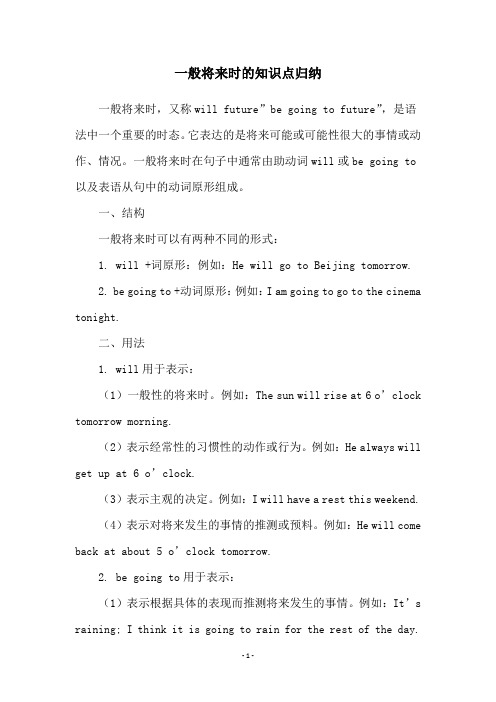
一般将来时的知识点归纳一般将来时,又称will future”be going to future”,是语法中一个重要的时态。
它表达的是将来可能或可能性很大的事情或动作、情况。
一般将来时在句子中通常由助动词will或be going to 以及表语从句中的动词原形组成。
一、结构一般将来时可以有两种不同的形式:1. will +词原形:例如:He will go to Beijing tomorrow.2. be going to +动词原形:例如:I am going to go to the cinema tonight.二、用法1. will用于表示:(1)一般性的将来时。
例如:The sun will rise at 6 o’clock tomorrow morning.(2)表示经常性的习惯性的动作或行为。
例如:He always will get up at 6 o’clock.(3)表示主观的决定。
例如:I will have a rest this weekend.(4)表示对将来发生的事情的推测或预料。
例如:He will come back at about 5 o’clock tomorrow.2. be going to用于表示:(1)表示根据具体的表现而推测将来发生的事情。
例如:It’s raining; I think it is going to rain for the rest of the day.(2)表示计划、安排在将来要做的事情。
例如:I am going to visit my grandparents next month.三、与其它将来时的比较1. 一般将来时意义最为模糊,它可以表示根据一般经验的推测或预料,也可以表示计划、安排在将来要做的事情,也可以表示本能反应。
2. 与将来完成时相比,一般将来时表达的动作或情况没有begore么强调时间先后顺序。
一般将来时的句型结构和例句

一般将来时的句型结构和例句1. 一般将来时的概念嘿,大家好!今天我们来聊聊一般将来时。
说到将来时,想必大家都有过这样的体验:想给朋友约个时间,或者规划个旅行,但又不知道该怎么表达对未来的期望和计划。
其实,一般将来时就像那颗星星,指引着我们走向未知的未来。
简单来说,它主要用来表示将来发生的事情。
这种时态很容易搞定,通常使用“will”或者“be going to”来构成,简单明了,不费吹灰之力。
2. 一般将来时的基本结构2.1 “will”结构首先,我们来看看用“will”构成的一般将来时。
它的句型结构就是:主语 + will + 动词原形。
比如,如果你想告诉朋友“我明天会去图书馆”,你可以说“I will go to thelibrary tomorrow。
”听起来是不是很顺畅呢?再比如,“她会参加派对”就可以说成“She will attend the party.”是不是感觉自己就像个未来学家?2.2 “be going to”结构接下来,我们聊聊“be going to”结构。
这个结构的形式是:主语 + be (am/is/are) + going to + 动词原形。
比如,“我打算去旅行”可以说“I am going to travel.” 这里的“going to”就像个小火箭,把我们的计划送向未来。
再来个例子:“他们准备去看电影”就可以说“They are going to watch a movie.” 听起来是不是很有干劲?3. 一般将来时的应用场景3.1 表达意图和计划那么,一般将来时到底在哪些场合能派上用场呢?哦,真是无处不在!比如,当你和朋友一起讨论周末的计划时,“我们将去海滩吗?”可以问“We will go to the beach, right?”或者,当你在职场上,需要告诉同事下周的会议时间时,“我们下周三会开会”可以说“We will have a meeting next Wednesday.” 这些都是日常生活中常见的场景,毫不费力地用上将来时,简直就是小菜一碟!3.2 预测未来此外,一般将来时也常用于预测未来。
一般将来时的表达形式
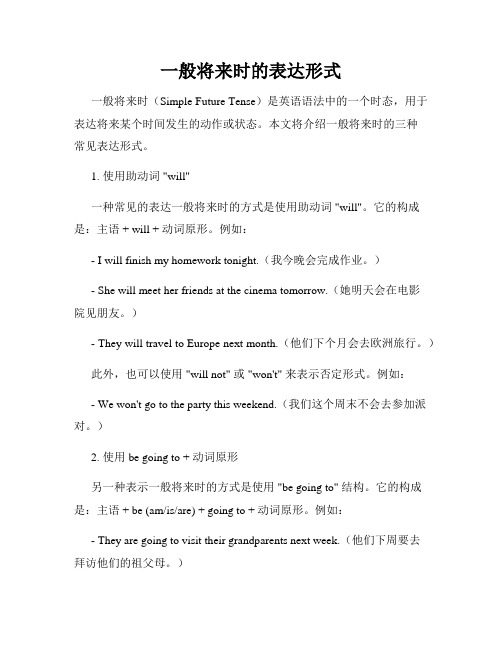
一般将来时的表达形式一般将来时(Simple Future Tense)是英语语法中的一个时态,用于表达将来某个时间发生的动作或状态。
本文将介绍一般将来时的三种常见表达形式。
1. 使用助动词 "will"一种常见的表达一般将来时的方式是使用助动词 "will"。
它的构成是:主语 + will + 动词原形。
例如:- I will finish my homework tonight.(我今晚会完成作业。
)- She will meet her friends at the cinema tomorrow.(她明天会在电影院见朋友。
)- They will travel to Europe next month.(他们下个月会去欧洲旅行。
)此外,也可以使用 "will not" 或 "won't" 来表示否定形式。
例如:- We won't go to the party this weekend.(我们这个周末不会去参加派对。
)2. 使用 be going to + 动词原形另一种表示一般将来时的方式是使用 "be going to" 结构。
它的构成是:主语 + be (am/is/are) + going to + 动词原形。
例如:- They are going to visit their grandparents next week.(他们下周要去拜访他们的祖父母。
)- I am going to learn how to play the piano.(我打算学习弹钢琴。
)- She isn't going to eat fast food anymore.(她不再打算吃快餐了。
)该结构也可以用于否定形式,只需在 "be" 后加 "not"。
一般将来时的定义、结构、例句、用法
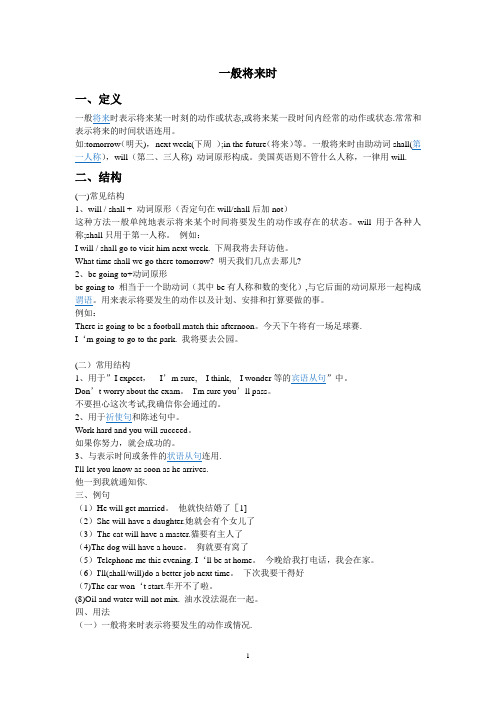
一般将来时一、定义一般将来时表示将来某一时刻的动作或状态,或将来某一段时间内经常的动作或状态.常常和表示将来的时间状语连用。
如:tomorrow(明天),next week(下周);in the future(将来)等。
一般将来时由助动词shall(第一人称),will(第二、三人称) 动词原形构成。
美国英语则不管什么人称,一律用will.二、结构(一)常见结构1、will / shall + 动词原形(否定句在will/shall后加not)这种方法一般单纯地表示将来某个时间将要发生的动作或存在的状态。
will用于各种人称;shall只用于第一人称。
例如:I will / shall go to visit him next week. 下周我将去拜访他。
What time shall we go there tomorrow? 明天我们几点去那儿?2、be going to+动词原形be going to 相当于一个助动词(其中be有人称和数的变化),与它后面的动词原形一起构成谓语。
用来表示将要发生的动作以及计划、安排和打算要做的事。
例如:There is going to be a football match this afternoon。
今天下午将有一场足球赛.I‘m going to go to the park. 我将要去公园。
(二)常用结构1、用于”I expect,I’m sure, I think, I wonder等的宾语从句”中。
Don’t worry about the exam。
I'm sure you’ll pass。
不要担心这次考试,我确信你会通过的。
2、用于祈使句和陈述句中。
Work hard and you will succeed。
如果你努力,就会成功的。
3、与表示时间或条件的状语从句连用.I'll let you know as soon as he arrives.他一到我就通知你.三、例句(1)He will get married。
一般将来时英语定义

一般将来时在英语中用于表示将要发生的动作或状态,以及对将来事件的预测、计划或打算。
它通常与表示未来时间的词或短语一起使用,如tomorrow(明天)、next week(下周)、in the future(将来)等。
在结构上,一般将来时主要有以下两种形式:
1. 使用助动词"will" 或"shall" 加动词原形构成,例如:
- I will go to the gym tomorrow. (我明天会去健身房。
)- She shall complete her project by next month. (她会在下个月完成她的项目。
)
2. 使用"be going to" 结构,即主语+ am/is/are + going to + 动词原形,例如:
- We are going to have a meeting at 3 pm. (我们将在下午3点开会。
)
- He is going to study abroad next year. (他明年打算出国留学。
)
另外,在某些情况下,现在进行时也可以表示按计划或安排即将发生的未来事件,这被称为“未来进行时”的用法。
小升初英语一般将来时的构成及用法

四、Revision of all forms with future meaning
(一). be going to+动词原形
1. 表示说话人根据现在已有的迹象,判断将要或即将 发生某种情况。这类句子的主语可以是人,也可是物。 例如:
We, You, …are going aren't going Are…going to
They
to work
to work
work?
2. shall/will + 动词原形
一般将来时助动词shall/will + 动词原形 (当主语第一人称时,一般用shall,shall用于第一 人称,常被will 所代替。)
❖ 对特殊疑问句要进行具体回答。
一般将来时的主要用法:
1、表示将来某一时刻的动作或状态: We shall(will) come to see you the day after tomorrow. There will be a wonderful show next week.
2、表示将来某一段时间内经常的动作或状态: The students will come and work in the lab once a week. we shall come and work in this factory every year.
例词
look play start live hope use
looked played started lived hoped used
stop stopped plan planned trip tripped
一般将来时
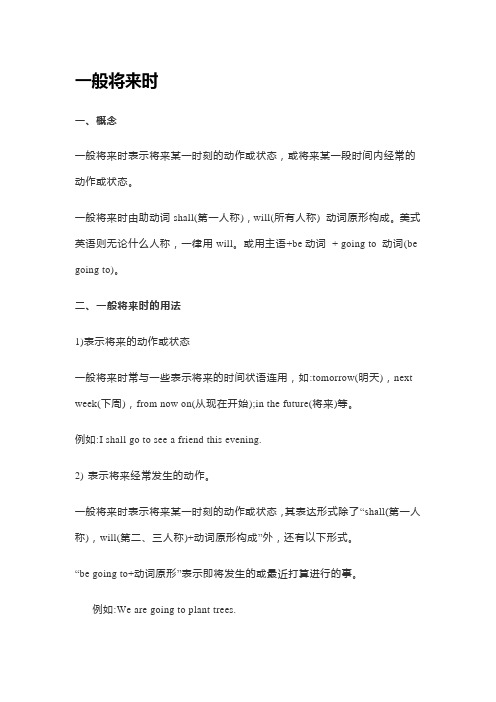
一般将来时一、概念一般将来时表示将来某一时刻的动作或状态,或将来某一段时间内经常的动作或状态。
一般将来时由助动词shall(第一人称),will(所有人称) 动词原形构成。
美式英语则无论什么人称,一律用will。
或用主语+be动词+ going to 动词(be going to)。
二、一般将来时的用法1)表示将来的动作或状态一般将来时常与一些表示将来的时间状语连用,如:tomorrow(明天),next week(下周),from now on(从现在开始);in the future(将来)等。
例如:I shall go to see a friend this evening.2)表示将来经常发生的动作。
一般将来时表示将来某一时刻的动作或状态,其表达形式除了“shall(第一人称),will(第二、三人称)+动词原形构成”外,还有以下形式。
“be going to+动词原形”表示即将发生的或最近打算进行的事。
例如:We are going to plant trees.三、一般将来时的句型①肯定句:主语+ be going to do /will/shall+ 动词原形②否定句:主语+ be not going to do /will not/shall not+ 动词原形③疑问句:Be动词+主语+ going to do /Will/Shall+主语+ 动词原形简略回答:(肯)Yes,主语shall/will (否) No,主语+shan't/won't④特殊疑问句:特殊疑问词+一般疑问句(就主语提问时,以疑问词who开头的疑问词除外)----- Why will you be here on Sunday?(周日你为什么将要在这儿?)-----I will have a meeting on Sunday(我将要在周日举行一个聚会)(对特殊疑问句要进行具体回答)一般疑问句:be或will提到句首,some改any,and改or,第一二人称互换We are going to go on an outing this weekend.-------Are you going to go on an outing this weekend?被动句:will/shall+be+v.ed(及物动词过去分词)The letter will be sent tomorrow.这封信明天将寄出去We shall be punished if we break the rule.如果我们违反规定,我们将受到惩罚。
there be句型的一般将来时结构
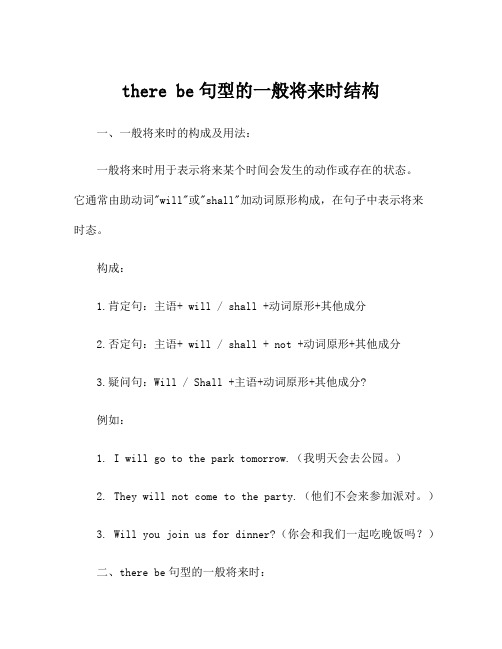
there be句型的一般将来时结构一、一般将来时的构成及用法:一般将来时用于表示将来某个时间会发生的动作或存在的状态。
它通常由助动词"will"或"shall"加动词原形构成,在句子中表示将来时态。
构成:1.肯定句:主语+ will / shall +动词原形+其他成分2.否定句:主语+ will / shall + not +动词原形+其他成分3.疑问句:Will / Shall +主语+动词原形+其他成分?例如:1. I will go to the park tomorrow.(我明天会去公园。
)2. They will not come to the party.(他们不会来参加派对。
)3. Will you join us for dinner?(你会和我们一起吃晚饭吗?)二、there be句型的一般将来时:将来时的there be句型通常用于描述将来某个时间或地点会有什么人或物存在。
这一句型的构成一般为:there + will be +名词+其他成分。
例如:1. There will be a meeting in the conference room tomorrow.(明天会有一个会议在会议室里。
)2. There will be a new shopping mall opening in our neighborhood next year.(明年我们社区将开设一家新的购物中心。
)3. There will not be any tickets left for the concert.(音乐会的票将会卖光。
)4. Will there be a thunderstorm tonight?(今晚会有雷暴吗?)三、使用there be句型一般将来时的注意事项:1.动词be的形式根据后面的名词单复数而变化,例如:Therewill be a book on the table.(桌子上会有一本书。
一般将来时的构成和用法

一般将来时的构成和用法一般将来时是英语中用来表达将来发生的动作或事件的时态。
它的构成相对简单,一般由助动词“will”+动词原形构成。
在某些情况下,也可以使用“be going to”来表示将来时。
一、构成1. “will + 动词原形”二十年后,我将会是一名成功的科学家。
Twenty years from now, I will be a successful scientist.2. “be going to + 动词原形”明天,我打算去购物。
I am going to go shopping tomorrow.二、用法1. 表示计划或意图我明天打算学习数学。
I will study math tomorrow.2. 表示预测或猜测我认为明天会下雨。
I think it will rain tomorrow.3. 表示承诺或意愿我会帮你完成这个项目。
I will help you with this project.4. 表示打算或决定我打算明天早上锻炼身体。
I am going to exercise in the morning.5. 表示预定或安排明天我将和朋友们去看电影。
I will go to the movies with friends tomorrow.三、注意事项1. 一般将来时通常与表示将来的时间状语连用,比如tomorrow(明天)、next week(下周)、in the future(将来)等。
2. 当表示按计划或安排好的未来事件时,一般使用“be going to”而不是“will”,因为“be going to”强调的是事先的决定或计划。
3. 一般将来时所表示的动作或事件并不一定是肯定会发生的,而是说话人的预测、打算、意愿等。
四、例句1. 我将和朋友一起去看电影。
I will go to the movies with my friends.2. 我会告诉你事情发生的细节。
一般将来时的构成和用法
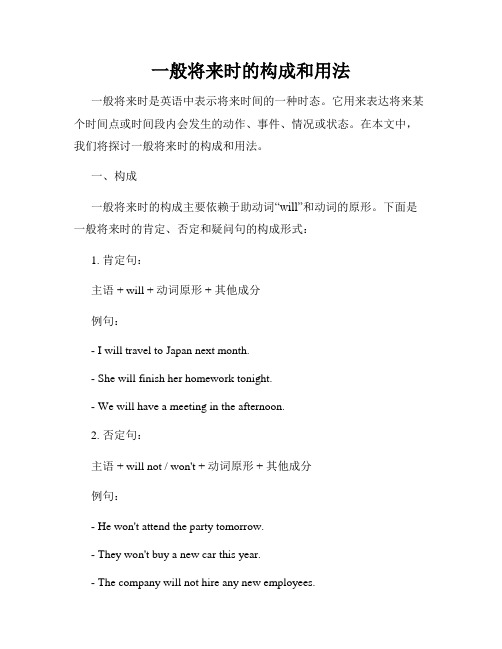
一般将来时的构成和用法一般将来时是英语中表示将来时间的一种时态。
它用来表达将来某个时间点或时间段内会发生的动作、事件、情况或状态。
在本文中,我们将探讨一般将来时的构成和用法。
一、构成一般将来时的构成主要依赖于助动词“will”和动词的原形。
下面是一般将来时的肯定、否定和疑问句的构成形式:1. 肯定句:主语 + will + 动词原形 + 其他成分例句:- I will travel to Japan next month.- She will finish her homework tonight.- We will have a meeting in the afternoon.2. 否定句:主语 + will not / won't + 动词原形 + 其他成分例句:- He won't attend the party tomorrow.- They won't buy a new car this year.- The company will not hire any new employees.3. 疑问句:Will + 主语 + 动词原形 + 其他成分?例句:- Will you come to the concert with me?- Will they start the project next week?- Will he call you later?二、用法一般将来时主要用来表示以下几种情况:1. 预测和推测:- I think it will rain tomorrow.- She believes he will be a successful actor. - The team will probably win the game.2. 承诺和意愿:- I will help you with your project.- They will support the charity event.- We will do our best to achieve our goals.3. 提议和请求:- Will you go to the movies with me?- Will you please pass me the salt?- Will you marry me?4. 时间和日程安排:- The train will arrive at 10 o'clock.- She will meet her friends at the café.- We will have a meeting on Monday.5. 习惯和倾向:- He will often go jogging in the morning.- They will usually eat dinner at home.- She will always help others in need.6. 条件句中的将来时:- If it rains, I will stay at home.- She will buy a car if she saves enough money.- We will go to the beach if the weather is nice.三、注意事项在使用一般将来时时,需要注意以下几点:1. 当主句是条件句时,通常会使用一般将来时来表示将来的结果。
一般将来时用法小结
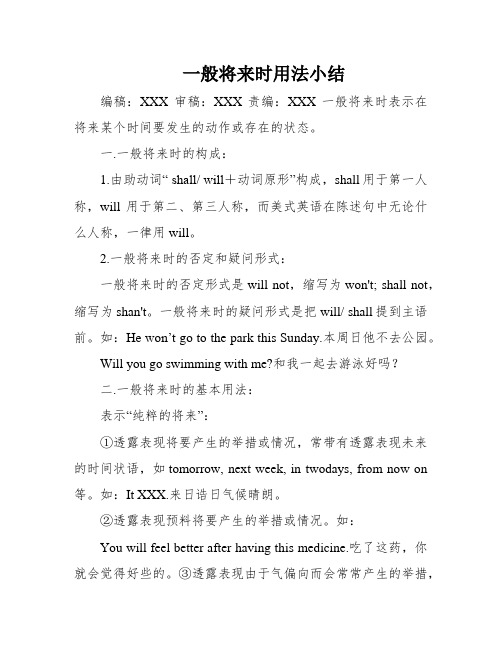
一般将来时用法小结编稿:XXX审稿:XXX责编:XXX一般将来时表示在将来某个时间要发生的动作或存在的状态。
一.一般将来时的构成:1.由助动词“ shall/ will+动词原形”构成,shall用于第一人称,will用于第二、第三人称,而美式英语在陈述句中无论什么人称,一律用will。
2.一般将来时的否定和疑问形式:一般将来时的否定形式是will not,缩写为won't; shall not,缩写为shan't。
一般将来时的疑问形式是把will/ shall提到主语前。
如:He won’t go to the park this Sunday.本周日他不去公园。
Will you go swimming with me?和我一起去游泳好吗?二.一般将来时的基本用法:表示“纯粹的将来”:①透露表现将要产生的举措或情况,常带有透露表现未来的时间状语,如tomorrow, next week, in twodays, from now on 等。
如:It XXX.来日诰日气候晴朗。
②透露表现预料将要产生的举措或情况。
如:You will feel better after having this medicine.吃了这药,你就会觉得好些的。
③透露表现由于气偏向而会常常产生的举措,本用法中的will要重读。
如:XXX.[谚语]男孩究竟结果是男孩。
2.透露表现“带有神态意义的未来”,用来透露表现企图,用will来透露表现。
如:I will be XXX.下次我要愈加谨慎。
I won't go shopping this afternoon, but she will.今天下午我不想去购物,但她想去。
will在疑问句中,用来表示有礼貌地征询对方的意见。
如:Will you have some more tea?要不要再喝点茶?What shall we do this weekend?本周末我们要干什么?三.一般未来时的其它几种透露表现法:1.用be going to表示:be going to相当于一个助动词,与其后的动词原形一起构成句子的谓语,表示近期将要发生的动作或存在的状态。
- 1、下载文档前请自行甄别文档内容的完整性,平台不提供额外的编辑、内容补充、找答案等附加服务。
- 2、"仅部分预览"的文档,不可在线预览部分如存在完整性等问题,可反馈申请退款(可完整预览的文档不适用该条件!)。
- 3、如文档侵犯您的权益,请联系客服反馈,我们会尽快为您处理(人工客服工作时间:9:00-18:30)。
一般将来时的构成:
人称肯定句否定句
一I/We will/ am/is/are going to + do. I/We will not will/ am/is/are not going to + do
二You will / am/is/are going to + do You will / am/is/are not going to + do
三He/She/It/They will / am/is/are going to + do He/She/They will / am/is/are not going to + do
will= am/is/are going to
一般将来时由助动词(will,shall)+动词原形构成,shall主要用于以第一人称(I,We)为主语的疑问句中.
1.概念:表示将要发生的动作或存在的状态及打算、计划或准备做某事。
2.时间状语:tomorrow, next day(week, month, year…),soon, in a few minutes, by…,the day after tomorrow, etc.
3.基本结构:am/is/are/going to + do;will/shall + do.
4.否定形式:will + not am/is/are not going to 动词用原形
5.一般疑问句:be放于句首;will/shall提到句首。
6.例句:They are going to have a competition with us in studies. It is going to rain.
1. There __________ a meeting tomorrow afternoon.
A. will be going to
B. will going to be
C. is going to be
D. will go to be
2. Charlie ________ here next month.
A. isn’t working
B. doesn’t working
C. isn’t going to working
D. won’t work
3. He ________ very busy this week, he ________ free next week.
A. will be; is
B. is; is
C. will be; will be
D. is; will be
4. There ________ a dolphin show in the zoo tomorrow evening.
A. was
B. is going to have
C. will have
D. i s going to be
5. –________ you ________ free tomorrow? –No. I ________ free the day after tomorrow.
A. Are; going to; will
B. Are; going to be; will
C. Are; going to; will be
D. Are; going to be; will be
6. Mother ________ me a nice present on my next birthday.
A. will gives
B. will give
C. gives
D. give
7. – Shall I buy a cup of tea for you? –________. (不,不要。
)
A. No, you won’t.
B. No, you aren’t.
C. No, please don’t.
D. No, please.
8. – Where is the morning paper? – I ________ if for you at once.
A. get
B. am getting
C. to get
D. w ill get
9. ________ a concert next Saturday?
A. There will be
B. Will there be
C. There can be
D. There are
10. If they come, we ________ a meeting.
A. have
B. will have
C. had
D. would have。
